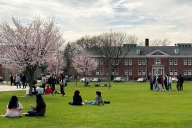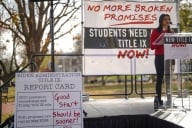You have /5 articles left.
Sign up for a free account or log in.
WASHINGTON -- Major disciplinary associations representing sociologists, psychologists and historians are offering the U.S. Supreme Court advice this week on two cases before it concerning gay marriage.
In briefs filed or about to be filed with the court, the associations are citing what they call a scholarly consensus on key research issues that are part of the legal arguments before the court. So while many scholars in the associations support gay marriage rights, the briefs themselves focus on scholarly issues. And briefs filed by individuals -- some of them scholars -- opposed to gay marriage deal with some of the same research questions, but draw very different conclusions.
In addition, at least one college -- Patrick Henry College -- has filed a brief with the Supreme Court, opposing gay marriage. "[B]ased on its moral convictions arising from its traditional Christian faith, the college views the practice of homosexuality as moral error and would refuse any recognition of same-sex marriage for any of its internal purposes," the brief says. "The outcome of this litigation could operate effectively to change the law of Virginia to require legal recognition of same-sex marriage within the Commonwealth. This could impact the College’s ability to deny such recognition for its internal purposes."
Most of the briefs from disciplinary associations and groups of scholars focus on research. Briefs by the American Sociological Association and the American Psychological Association discuss at length research on the children of same-sex couples. Opponents of gay marriage have argued that children benefit from being raised by a mother and father in a traditional, opposite-sex marriage -- and the social science associations say that there is no valid research basis for such a claim. Because courts generally want to see a public good or compelling reason to justify discrimination, and because opponents of gay marriage cite child-rearing as part of their argument, the issue at play here could be significant.
The American Historical Association, meanwhile, is joining a brief being filed today by individual historians on the narrow question of the way marriage law has been set in the United States. The historians' brief argues that the Defense of Marriage Act, a federal law barring gay marriage, runs counter to the tradition in the United States of Congress deferring to states on issues related to marriage. The brief argues that there should not be bans on states permitting same-sex marriage, but it does not argue that states should be required to permit it.
Children and a Controversial Study
One reason cited by the disciplinary associations for filing briefs was their frustration with how research they question is being used by critics of gay marriage. Likewise, social scientists opposed to gay marriage accuse the disciplinary associations of relying on flawed research. One brief filed by seven social scientists prior to the APA's brief, predicted (accurately it turns out) that it and other groups would argue that children of same-sex couples do just fine -- and the seven social scientists disagree.
"A persistent claim by those supporting same-sex marriage is that there is 'no difference' in the outcomes of children raised by a biological mother and father and those who have been raised by two women or two men," the brief said. "That claim was made to the courts below, and will no doubt be made to this Court by associations like the American Psychological Association. But as recent scholarship indicates, the claim is difficult to support because nearly all of the studies upon which the 'no difference' assertion is based are rather limited, involving non-random, non-representative samples,often with relatively few participants. Specifically, the vast majority of the studies were based on samples of fewer than 100 parents (or children), and typically representative only of well-educated, white women (parents), often with elevated incomes. These are hardly representative samples."
But the associations representing social scientists argue that in fact there have been numerous valid studies -- persuasive to the vast majority in the disciplines -- that children of same-sex couples do just fine.
The brief from the American Sociological Association states that "the claim that same-sex parents produce less positive child outcomes than opposite-sex parents do -- either because such families lack both a male and female parent or because both parents are not the biological parents of their children -- contradicts abundant social science research. Decades of methodologically sound social science research, especially multiple nationally representative studies and the expert evidence introduced in the district courts below, confirm that positive child wellbeing is the product of stability in the relationship between the two parents, stability in the relationship between the parents and child, and greater parental socioeconomic resources. Whether a child is raised by same-sex or opposite-sex parents has no bearing...."
A brief that will be filed today by the American Psychological Association generally agrees with the sociology association and takes aim at research by a scholar (one of the seven in the brief cited above) whose work is much cited by opponents of gay marriage, and much criticized by proponents of gay marriage. That scholar is Mark Regnerus of the University of Texas at Austin, whose work argues that children of same-sex couples may be at a disadvantage in life. For the last year, many scholars have challenged the validity of Regnerus's work (even as he has defended it) -- and that disagreement now plays out before the justices of the Supreme Court.
The APA brief notes that scores of social scientists have objected to the Regnerus study, saying that it skews the evidence against gay and lesbian parents by including many with "family instability," as opposed to gay couples who have led stable families. The underlying problem with the Regnerus study, the brief argues, i added this ref, otherwise it sounded like you saying it. is "conflation of family instability with any potential effects of parental sexual orientation." Further the brief says that social scientists don't deny a range of factors affect parenting ability -- and that gay and lesbian parents aren't uniformly good parents. But the brief says that what is clear from the research is that imperfect parenting by gay and lesbian parents is not due to sexual orientation, just as imperfect parenting by straight parents is not due to sexual orientation.
And citing research on stigma, the APA brief says that those who claim to be worried about the children of gay parents are actually encouraging societal forces that hurt those children -- the "unreasoned antipathy" toward gay people (these children's parents) that results in stigma.
'Trying to Get the History Right'
James Grossman, executive director of the American Historical Association, said in an interview that some members of the organization asked for the AHA to sign on to a brief being filed today by many individual historians. He characterized the issue of the brief as straightforward: In American history, states and not Congress have set marriage policy.
"We are not taking a political position here," Grossman said. The brief undercuts the basis for the Defense of Marriage Act, but does not state what state policy should be. Grossman said that when the historical record is distorted (as he said it is by those who consider it consistent with American history for Congress to set marriage policy), the association should speak out.
"It's a very straightforward argument," he said. "Marriage has in fact been the province of the states. We're trying to get the history right."








